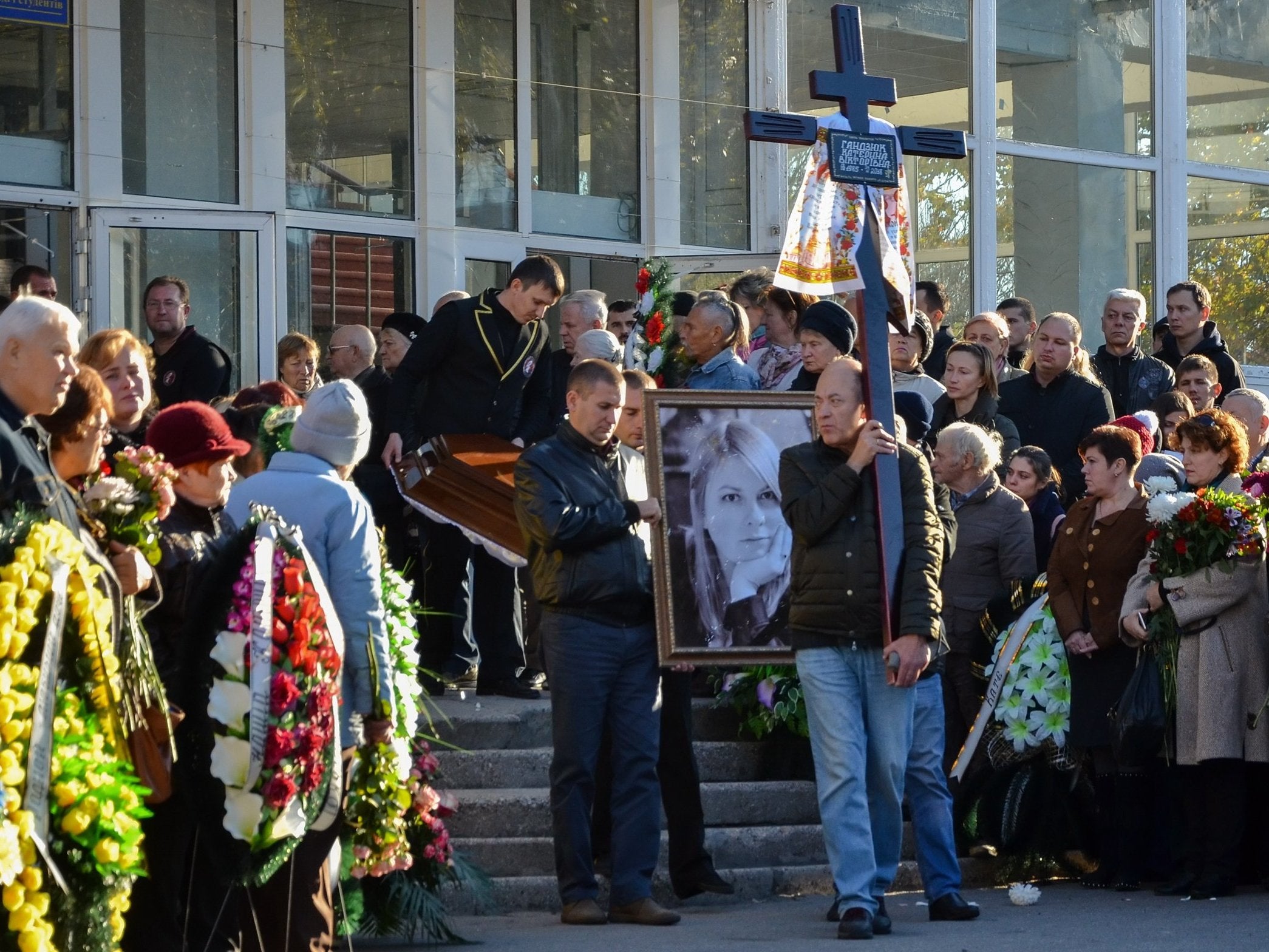
There was the blue and yellow of the Ukrainian trident, for if there was one thing Kateryna Handzyuk fought for it was to ensure her Kherson region did not follow the route of neighbouring Crimea. And then there were the stars of the EU, for if there was anything she wanted more, it was that the new Ukraine aligned itself with European values.
Ms Handzyuk’s death on Sunday came three agonising months after being attacked with a concentrated solution of sulphuric acid. The activist and mayoral aide suffered 30 per cent burns and underwent a dozen operations, before eventually succumbing to a blood clot.
Prosecutors initially caused public outrage by classifying the acid attack as hooliganism, and have been accused of a sluggish investigation.
In an interview given from her hospital bed little over a month before her death, the activist and mayoral aide offered her own rebuke of that probe.
“Yes, I look bad now, but I’m being cured by good, Ukrainian doctors. And I know this: I look a lot better than the state of Ukrainian fairness and justice today.”
Friends at Wednesday’s funeral told The Independent that Ms Handzyuk stood out for her directness and honesty – in a country much more used to compromise.
People knew her as incorruptible and immovable, says local businessman and long-time friend Alexander Savich, 28.
“Pre-Maidan politicians haven’t gone anywhere ... They a green light to do whatever they want so long as they remain loyal.”
“Katya’s values were quite distinct from the material values that the local corrupt elite still thinks in. For many of them, she was the woman you could never reach a deal with.”
Another friend, Katya Mola, 36, says Ms Handzyuk’s profile and media skills had made local corruption issues national news. She campaigned against illegal forest felling and the misappropriation of weapons intended to be used on the frontline. All of these interventions “caused problems” for certain local interests.
It isn’t clear which of these issues provoked the attack. Ms Handzyuk’s lawyer, Yevgeniya Zakrevskaya, instead prefers to describe it as a “consequence of systemic conflict”.
The activist was part of a “new generation of pro-reform politicians, forged by the idealism of the Euromaidan revolution”. She had tried to change local politics, and was a prominent figure in the region. But she belonged to a layer of new politicians co-existing in parallel and in conflict with the old guard.
“Pre-Maidan politicians haven’t gone anywhere,” says Ms Zakrevskaya. “The old layer of regional elites remains, and have been given a green light to do whatever they want provided they stay loyal.”

Ukraine’s vulnerable coalition – with power resting on votes from the security bloc – has meant its leaders rarely depart from the most pragmatic and cynical considerations. In some Ukrainian regions, this can look like a modern version of feudalism, with regional tough guys able to operate with impunity. In the last two years alone, there have been 55 attacks on activists, many of them linked to local political and security figures. Few have been properly investigated.
Ms Zakrevskaya says clans and alliances have got in the way of this police investigation too. Five men believed to be involved in the attack have already been arrested, and four of them have already pleaded guilty. But police have not yet established who ordered the attack, and the political will to do so does not seem to be there.
Several lines of inquiry lead back to police authorities themselves.
Ms Handziuk had complained about police surveillance in the months before her attack, her friend Katya Mola says: “She told me in hospital that she had become so used to it that when the attack happened, her guard was down.” Other reports claim to have evidence that an aide to a local MP with strong police links passed money to those who carried out the attack.
Lawyer Zakrevskaya says both claims have yet to be investigated properly.
On Monday, several dozen local NGOs signed a letter criticising the “apparent failure” of the law enforcement system to investigate attacks on civil society activists. It called on the resignations of Interior Minister Arsen Avakov and Prosecutor General Yuri Lutsenko, both of whom have been criticised for obstructing the investigation.
For a fleeting moment, it seemed at least one of the men would answer that call. On Tuesday, Mr Lutsenko addressed parliament and said he would indeed offer his resignation amid the outrage. But a short while later, he showed his full hand: the offer was summarily rejected by the presidential bloc with which he is usually aligned.
It was a cynical sleight first demonstrated by his predecessor Viktor Shokhin three years ago. Then, the controversial prosecutor “resigned” several times, was “unresigned” several times, before eventually being forced out amid Western pressure.
At Wednesday’s ceremony, friends suggested that the West has not always been consistent in applying pressure on the Ukrainian elite to “do the right thing.” Indeed, in pushing activists to do dangerous work, perhaps Ms Handziuk’s beloved Europe even shouldered a portion of the blame for the attack?
“The West wants to promote its values and civil society,” says Alexander Savich. “But is that not senseless if the people it trains are then murdered for holding those very values?”







